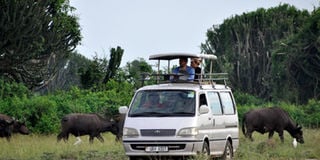WB cuts funding for Shs46b hotel tourism institute

As a key sector, tourism should be given special attention. The institute is a good addition in terms of professionalising the sector. PHOTO BY EDGAR R BATTE
What you need to know:
- Magnitude. Funding for the Jinja-based Hotel and Tourism Training institute, according to the Minister Ephraim Kamuntu, has been cut from the initial Shs46.2b) to Shs25.2b.
- The tourism sector has been growing over the years, becoming the biggest foreign exchange earner. It has overtaken coffee, tea and foreign remittances . Currently the sector earn about $1.4b (Shs5 trillion).
The Ministry of Tourism has said the World Bank has reduced funding for construction of the Jinja based Hotel and Tourism Training from the initial $13m (Shs46.2b) to $7m (Shs25.2b)
Addressing journalists in Kampala, Ephraim Kamuntu the Tourism minister, said together with the Work Bank funded Competitive Enterprise Development Programme (CEDP) they expect the ground breaking ceremony for the construction works to begin next month even as funding has been slashed.
Asked where they will get the balance of the money to top up the deficit, Stephen Asiimwe the executive director Uganda Tourism Board said there the difference had been occasioned by dollar fluctuations and it would be adjusted to reflect the current dollar rates.
The Uganda Hotel and Tourism Training Institute, is a government hotel and tourism professionals training institute established by Parliament in 1994 to train Ugandans in hotel management and tourism-related courses.
It is housed in the former Crested Crane Hotel in Jinja.
The rehabilitation and construction of a modern hotel and tourism training institute in the country has turned into lip-service after a number of probes into financial losses in the tourism sector have pointed fingers towards it as a conduit for theft of donor funds.
During the probe into the loss of the World Bank funded Protected Areas Management and Sustainability Unit management project in the Uganda Wildlife Authority, it was mentioned as one of the areas which received funding without any visible work that the money had done.
However, now that rehabilitation of the institute is imminent, Prof Kamuntu, said the institute will go as far as affecting the hotel sector management.
“If you go to all the top hotels in the country, you will find that they are managed by foreigners. We do not have Ugandans there so we must build our local expertise. Anytime next month we shall be going for the ground breaking ceremony,” he said.
According to Prof Kamuntu, the institute is expected to be upgraded to one of the finest training standards in the country given that tourism currently ranks top among Uganda’s foreign exchange earners.
The sector has taken over coffee, tea and foreign remittances from Ugandans living abroad.
He said they will collaborate with other training institutions around the world to set up facilities so that Ugandans are able to get international skills.
According to Mr Assimwe, among the activities they have undertaken to streamline services in the leisure and hospitality sector standardising different facilities in the tourism and hospitality chain.
“We have been inspecting hotels, restaurants, lodges and guest houses, sensitizing the owners about the minimum standards as well as carrying out an inventory of the different types of facilities we have in the country,” he said.
IMPORTANT
The tourism sector has been growing over the years, becoming the biggest foreign exchange earner. It has overtaken coffee, tea and foreign remittances . Currently the sector earn about $1.4b (Shs5 trillion).




